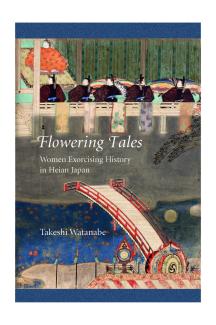Event

History Through Tales: A Death of an Empress in Eiga Monogatari
Empress Teishi appears prominently in Sei Shonagon’s The Pillow Book, but as scholars have noted, that work strategically presents the brighter side to Teishi’s life. Just as strategic is Teishi’s representation in The Tale of Flowering Fortunes (Eiga monogatari). In my talk, I analyze this work’s depiction of her last years and death to claim that in deploying the affective language of tales (the monogatari), Eiga sought to quell the threat her family’s vengeful spirits posed to those in power.
Takeshi Watanabe is the author of Flowering Tales: Women Exorcising History in Heian Japan. The book examines A Tale of Flowering Fortunes, a historical tale contemporaneous to The Tale of Genji (c. 1000). It shows how the rise of writing in the vernacular allowed for a new, shamanic type of history, one that sought to capture court gossip and channel its divisive energy into stories that brought healing. The book aims to inspire conversations about what constitutes historical writing and its aims.